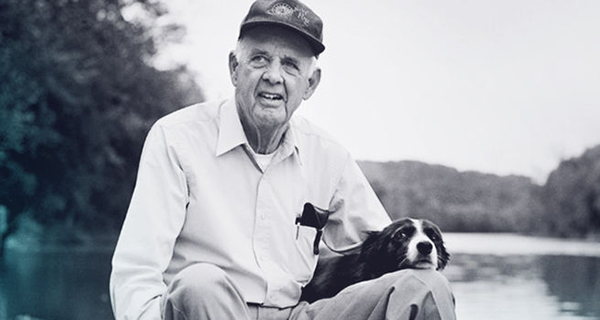My mother-in-law loves me.
I know I’m in her good graces, and she considers me part of her family. I can testify to such assurance because she lavishes me with her chosen form of affection.
Her delivery method? Arguing. She’ll lock horns with me over damn near anything.
While I’m riding shotgun in her SUV, she declares: “We’ve lucked out on the weather today. Nice cool breeze coming off Lake Michigan. Not a cloud in the sky.”
“Yes,” I say. I glance out and up toward the heavens. “The firmament appears to be holding up. Beautiful day.”
“Well, I wouldn’t say ‘beautiful.’ It’s a fine day, but we don’t know what it will be like later, do we?” She says this with certitude, slightly upturning her voice at “do we.” Those words slip around me like a constricting serpent.
I choke out: “No, I don’t suppose we do. Things could go south pretty quickly.”
“Of course, things might get better,” she counters. “It could turn into a beautiful day. There’s no need to believe it will get worse, right?”
She feeds me lines like I’m a baby in a highchair. I, in turn, start to squirm, fuss and fight the urge to soil myself. She glances over at me with pity on her face. Her expression a mixture of fascination and disappointment at my lack of basic oral communication skills. My reluctance to debate my mother-in-law joins a list of growing shortcomings I’m sure she’s keeping tabs on, including my limited knowledge of tax preparation, inept woodworking skills and refusal to call Ronald Reagan a good president in her presence.
I stare back at her like an infant whose face is smeared with pureed sweet potato. This would be a cute image, except I’m a 40-year-old, 200-pound man with facial hair.
I stare back at her like an infant whose face is smeared with pureed sweet potato. This would be a cute image, except I’m a 40-year-old, 200-pound man with facial hair.
“No,” I say. Thinking fast, I decide to invoke the Psalmist. “After all, ‘This is the day the Lord has made. Let us rejoice and be glad in it.’” She’s a person of faith. Surely, this will land well.
Her silence breaks a moment later. “Oh, Justin. You’re such a silly goose.”
She calls my children this too. One is in elementary school and has an unhealthy affection for ketchup. The other still wears a diaper and loathes apples. I, like them, am a silly goose.

Justin Cox
We are a flock of silly geese.
This fact is something she and I can agree on.
Outside of the traumatizing banter with my mother-in-law, I despise divisiveness for the sake of divisiveness. I am not a soul who seeks out conflict. I hate debates and recoil at the mention of apologetics. Yet I’ve come to appreciate and embrace a virtue I believe has fallen to the wayside in our postmodern society — contrarianism.
I can think of no one who embodies the spirit of contrariness better than Wendell Berry, Kentucky’s agrarian, poet and social activist.
Berry, who turned 90 earlier this week, is an incongruous icon. His writings constantly call me to be at odds with a way of life not in harmony with the rest of the created world.
For years, he’s voiced and lived his lamentations. His refusal to utilize a computer and preference to perform farm labor with a plow and mule instead of a backhoe has caused him to be labeled a philistine by some and a prophet by others.
Berry, I sense, understands fully where he stands. Relishing the head-scratching he creates. In “The Contrariness of the Mad Farmer” he writes:
I am done with apologies. If contrariness is my
inheritance and destiny, so be it. If it is my mission
to go in at exits and come out at entrances, so be it.
I’m embracing this same inheritance, particularly when it comes to all expectations concerning my vocation as a minister. Like Berry, my destiny is not to remain still and await someone else to determine who I’m supposed to be. I am a moving target, hell-bent on keeping folks on their toes and thinking.
Seeking admittance to Berry’s International Priesthood of Contraries, you must get used to uncomfortable conversations.
Seeking admittance to Berry’s International Priesthood of Contraries, you must get used to uncomfortable conversations. For the last several years, I’ve had my fair share.
When they tell me, “Preachers need to wear jackets on Sunday morning at this church,” I tell them this job doesn’t pay enough for me to afford one.
When they tell me: “Wear whatever you want! This is a casual come-as-you-are body of seekers,” I show up in a cassock with a stole.
When they tell me about the church they go to on Sunday mornings, I tell them I usually find God out from under the steeple.
When they say, “Church isn’t a building,” I agree with them, but say I’m apt to get sentimental in the presence of stained glass.
When they tell me the best way to honor God is through education and studies, I tell them I think God might be after my heart.
When they told me: “Be careful of seminary. It’ll steal your faith,” I told them I went and was exposed to a bigger God there.
When they told me, “You’re a professional, now act like it,” I confessed to them my understanding of the divine has never advanced past amateur status.
When some said, “You’re called, and that settles it,” I told them my faith demands that I learn, seek and explore.
When they say, “That’s the way we’ve always done it,” I tell them, “That explains why you’re in the shape you’re in.”
When they say, “Let’s shake things up,” I tell them to remember where they came from.
When they proclaim, “Our community is entirely inclusive; all means all,” I tell them maybe it shouldn’t be.
And when they tell me it takes XYZ to be a member here, I tell them, “Maybe you need fewer bylaws and a bigger communion table.”
Walking away from those heart-to-hearts with my ears burning, I have felt what Berry speaks of …
Going against men, I have heard at times a deep harmony
thrumming in the mixture, and when they ask me what
I say I don’t know. It is not the only or the easiest
way to come to the truth. It is one way.
When someone attempts to place me inside a box restricting my thoughts, feelings and experiences, I want to push back and take a different stance, hopefully, to change their perspective.
I’m thankful to Berry for showing me that if I’m made in God’s image, just maybe God feels the same way, too.
Justin Cox received his theological education from Campbell University and Wake Forest University School of Divinity. He is an ordained minister affiliated with the Cooperative Baptist Fellowship and enrolled in the Doctor of Ministry program at McAfee School of Theology. When not spending time with his spouse and daughters, he can be found writing and baking late into the night. He currently resides in New England with his family. His thoughts and reflections are his own.
Related articles:
Bless your heart for producing professionals and satisfied saints when radical prophets are needed
The church in America needs to recover its balance
Wendell Berry expounds on gay marriage

